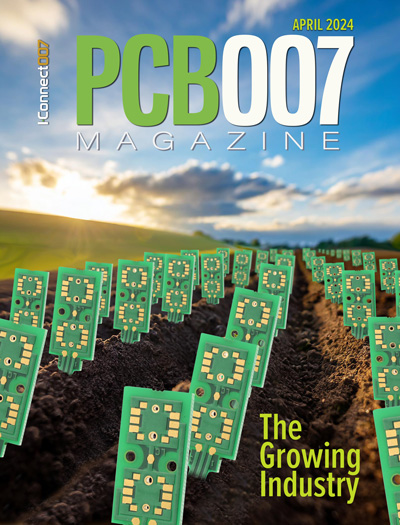-

- News
- Books
Featured Books
- pcb007 Magazine
Latest Issues
Current Issue
The Growing Industry
In this issue of PCB007 Magazine, we talk with leading economic experts, advocacy specialists in Washington, D.C., and PCB company leadership to get a well-rounded picture of what’s happening in the industry today. Don’t miss it.

The Sustainability Issue
Sustainability is one of the most widely used terms in business today, especially for electronics and manufacturing but what does it mean to you? We explore the environmental, business, and economic impacts.

The Fabricator’s Guide to IPC APEX EXPO
This issue previews many of the important events taking place at this year's show and highlights some changes and opportunities. So, buckle up. We are counting down to IPC APEX EXPO 2024.
- Articles
- Columns
Search Console
- Links
- Events
||| MENU - pcb007 Magazine
In Memoriam: Werner Peters, Founder of Lackwerke Peters
January 5, 2017 | EIPCEstimated reading time: 1 minute
Werner Peters, founder of Lackwerke Peters GmbH & Co. KG of Kempen, Germany, died on Jan. 1, 2017. He was 85.
Peters was one of the founders of the European PCB industry, developing the first German circuit boards back in 1956 in conjunction with colleagues at Isola and Ruwel. From 1970 onwards, when he took over a company in Krefeld, he expanded the company by developing resist chemistry to a high level, meeting the specifications of a number of OEMs not only in Europe but worldwide.
Under the name of Lackwerke Peters, his company moved to Kempen in 1984 to a purpose-built factory from where he produced a range of chemicals for the electronics industry of such eminence that his company is a true global supplier, rivalling competitors of much larger status. It is widely known that under his guidance his company developed products for niche applications as well as main-stream, giving a bespoke nature to chemistry that few companies have emulated. Indeed, the dedicated in-house R&D at the factory in Kempen helped the European electronics industry to meet the demand of the international market place.
A much-loved family man, Werner Peters gave of his time to serve on technical committees and to guide industry associations as a director, namelyVDI/VDE and VdL or ZVEI in particular, and encouraged young talent from local colleges in Kempen. Lackwerke Peters have been a member of EIPC for many years, and have been a valued contributor to the technology debates that have taken place at many venues over the years.
The Peters Group is now managed by his daughter Brigitte Schwartz and his son-in-law Ralf Schwartz as the second generation; they took over management responsibilities in 1995 and are loyal to his company philosophy and the fundamentals of his strong beliefs.
It might be said that Peters was one of the pioneers whose legacy is the foundation of a key supplier to a demanding technological industry that has not only kept pace, but led the way. For that, his contribution as a man has to be most highly regarded, and eternally remembered.
Suggested Items
Digitalisation and ESG
04/19/2024 | Marina Hornasek-Metzl, AT&SDigitalisation and ESG are prominent and high-priority topics in the global business community. The first focuses on applying technology throughout the value chain to produce faster, smarter, and more desirable business outcomes. The latter emphasises the broader value a business is expected to create for its stakeholders from an environmental, social, and governance perspective.
Real Time with... IPC APEX EXPO 2024: Looking Back, Looking Forward With IEC
04/19/2024 | Real Time with...IPC APEX EXPOIEC came to the RTW booth and discussed both the legacy of IEC's past and the vision for its future. Industry veteran Bruno Ferri highlighted his quarter-century tenure in the industry and with IEC since its founding. He still exhibits boundless enthusiasm for the industry. Brando Stone, a young professional and a future face of IEC, talked about IEC's plans going forward and his experience at this year's IPC APEX EXPO.
Seeking Employment: Meet Parker Capers
04/18/2024 | Barry Matties, I-Connect007Parker Capers, a cybersecurity professional with a decade of experience in the SMT industry, earned a bachelor’s degree from DeVry and is CompTIA Security Plus certified. He is open to various industries but has a strong affinity for manufacturing due to extensive familiarity. Parker appreciates smaller companies where personal connections matter. Are you hiring?
SEMI Applauds CHIPS Program Office Progress to Diversify U.S. Semiconductor Industry Workforce
04/18/2024 | SEMIThe SEMI Foundation, the arm of SEMI dedicated to supporting economic opportunity for workers and the sustained growth of the microelectronics industry by creating pathways and opportunities for job seekers, applauded strides made by the CHIPS Program Office to diversify the U.S. semiconductor industry workforce and its release of the First Annual Report Regarding the Opportunities and Inclusion Activities Undertaken by the Department of Commerce.
VDMA: Machine Vision Navigating Through Uncertain Times
04/18/2024 | VDMAFor over a decade, the European machine vision industry has reported steady growth, with turnover increasing by an average of 9 percent annually between 2012 and 2022. Despite a temporary setback in 2020 (minus 4 percent) due to the Covid-19 pandemic, the industry rebounded strongly in 2021 (plus 17 percent) and 2022 (plus 11 percent).


